The Importance Of Proper Pool Chemical Balance And Testing
Picture this: it's a hot summer day, and you're ready to take a refreshing dip in your pool. But as you approach the water, you notice it's cloudy, and there's a strange smell. Suddenly, your excitement fades. This scenario underscores why maintaining proper pool chemical balance is crucial. For pool owners and homeowners, understanding the importance of pool chemical balance ensures a safe and enjoyable swimming experience. This blog post will guide you through the essentials of pool chemistry, how to maintain it, and why it matters.
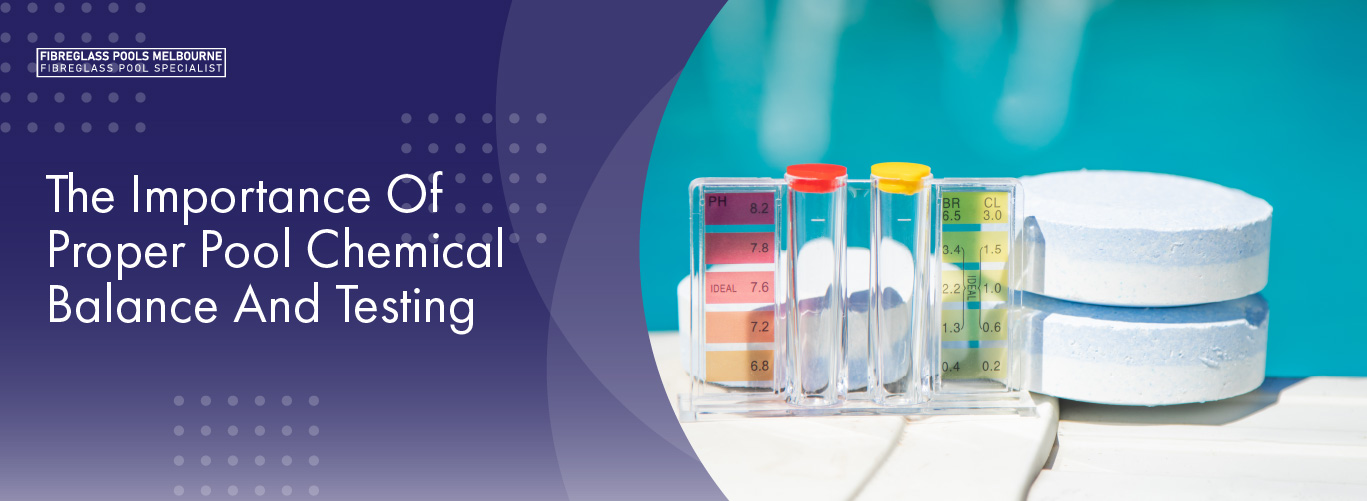
The Role of Essential Pool Chemicals
Chlorine
Chlorine is the superstar of pool chemicals. It’s responsible for killing bacteria, algae, and other harmful microorganisms that can thrive in pool water. Without chlorine, your pool would become a breeding ground for illnesses and infections. Keeping chlorine levels between 1.0 and 3.0 ppm (parts per million) is essential for a healthy swimming environment.
pH
The pH level measures how acidic or alkaline the pool water is. A pH level between 7.2 and 7.8 is ideal. If the pH is too low (acidic), it can cause skin and eye irritation and corrode pool equipment. Conversely, if the pH is too high (alkaline), it can lead to scaling on the pool surface and reduce the effectiveness of chlorine.
Alkalinity
Total alkalinity helps stabilise the pH levels in your pool. It acts as a buffer, preventing sudden changes in pH. Maintaining alkalinity levels between 80 and 120 ppm ensures that your pH levels remain steady. This balance protects the pool’s surface and equipment and makes the water more comfortable for swimmers.
Stabiliser
A pool stabiliser, often cyanuric acid, protects chlorine from being rapidly degraded by the sun’s UV rays. Stabiliser levels should be maintained between 30 and 50 ppm. Without a stabilizer, chlorine would dissipate quickly, leaving your pool vulnerable to contamination.
The Consequences of Imbalanced Pool Chemicals
Health Risks
Imbalanced pool chemicals pose significant health risks. For instance, low chlorine levels can lead to bacterial infections, while high chlorine levels can cause skin and eye irritation. Similarly, improper pH levels can result in discomfort and potential long-term health issues for swimmers.
Equipment Damage
Your pool equipment is also at risk when chemicals are not balanced. Acidic water can corrode metal components, such as ladders and pool pumps, leading to costly repairs. Alkaline water, on the other hand, can cause scaling, which reduces the efficiency of pool heaters and filters.
Aesthetic Issues
Visually, an imbalanced pool is unappealing. Algae growth, cloudy water, and scaling on pool surfaces are common issues that arise from improper chemical balance. These problems can turn your backyard oasis into an eyesore, detracting from the overall enjoyment of your pool.
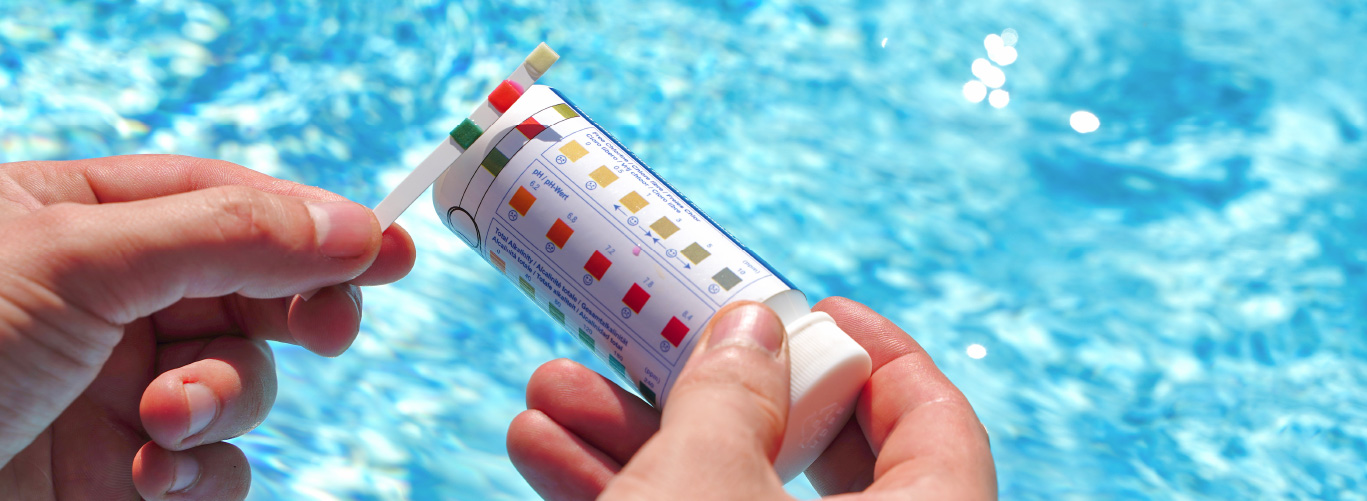
How to Test and Maintain Proper Pool Chemical Balance
Testing Kits
Regular testing is the foundation of maintaining proper pool chemical balance. Use testing kits or test strips to measure chlorine levels, pH, alkalinity, and stabiliser. These kits are user-friendly and provide quick results, allowing you to make necessary adjustments promptly.
Adding Chemicals
Based on your test results, you’ll need to add specific chemicals to balance your pool water. For example, if your chlorine levels are low, add chlorine tablets or granules. To adjust pH levels, use pH increasers or decreasers. Always follow the manufacturer’s instructions and wear protective gear when handling pool chemicals.
Routine Maintenance
Establish a routine maintenance schedule to ensure your pool stays balanced. Check your chemical levels at least twice a week during the swimming season and once a week during the off-season. Regular maintenance helps prevent imbalances and keeps your pool in top condition.
The Benefits of Regular Pool Chemical Maintenance
Safety
The primary benefit of regular pool chemical maintenance is safety. Balanced chemicals prevent the growth of harmful bacteria and algae, ensuring a safe swimming environment for you and your family. It also minimises the risk of skin and eye irritation caused by improper pH levels.
Cost Savings
Consistent maintenance can save you money in the long run. By preventing equipment damage and reducing the need for emergency chemical treatments, you avoid costly repairs and replacements. Additionally, balanced chemicals prolong the lifespan of your pool surfaces and equipment.
Enjoyment
A well-maintained pool is more enjoyable to swim in. Crystal-clear water, free of unpleasant odours and visible contaminants, enhances your swimming experience. Plus, regular maintenance means you spend less time troubleshooting issues and more time enjoying your pool.
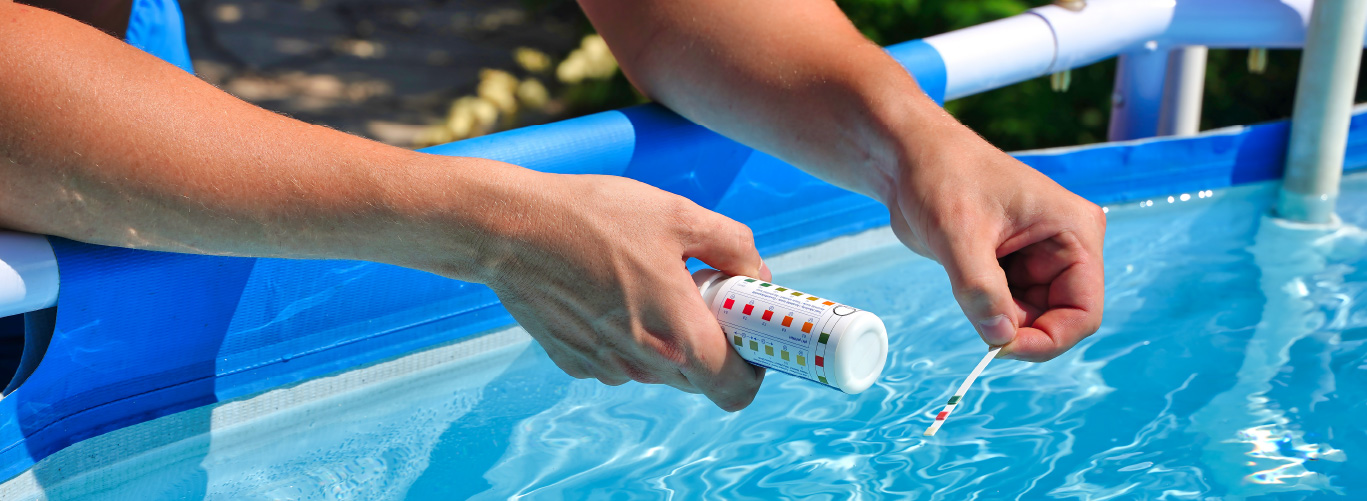
Tips for Troubleshooting Pool Chemical Imbalances
Cloudy Water
Cloudy water is a common issue that indicates improper chemical levels. Test your water and adjust chlorine, pH, and alkalinity levels accordingly. Using a clarifier can also help clear up the water by binding small particles together for easier filtration.
Algae Growth
Algae growth is often a sign of low chlorine levels. Shock your pool with a high dose of chlorine to kill the algae. Brush the pool surfaces and vacuum the debris. Regularly maintain chlorine levels to prevent future algae outbreaks.
Scaling
Scaling occurs when calcium deposits form on pool surfaces and equipment. Test your calcium hardness levels and adjust if necessary. Use a stain and scale remover to treat existing scaling. Maintaining proper pH and alkalinity levels can prevent scaling from recurring.
The Impact of Proper Pool Chemical Balance on Pool Health
Maintaining proper pool chemical balance is essential for the health and enjoyment of your swimming pool. By understanding the role of each chemical, such as chlorine for disinfection, pH balancers for comfort, and algaecides for preventing algae growth, you can keep your pool in optimal condition. Regularly testing and adjusting levels using reliable testing kits ensures that the water remains safe and clean. Additionally, troubleshooting common issues like cloudy water or pH imbalances can prevent larger problems down the line. Remember, a well-balanced pool not only looks great but also saves you time and money in the long run by reducing the need for extensive maintenance and repairs. Investing in proper pool care enhances the overall swimming experience for you and your guests.
The Importance Of Proper Pool Chemical Balance And Testing
Picture this: it's a hot summer day, and you're ready to take a refreshing dip in your pool. But as you approach the water, you notice it's cloudy, and there's a strange smell. Suddenly, your excitement fades. This scenario underscores why maintaining proper pool chemical balance is crucial. For pool owners and homeowners, understanding the importance of pool chemical balance ensures a safe and enjoyable swimming experience. This blog post will guide you through the essentials of pool chemistry, how to maintain it, and why it matters.
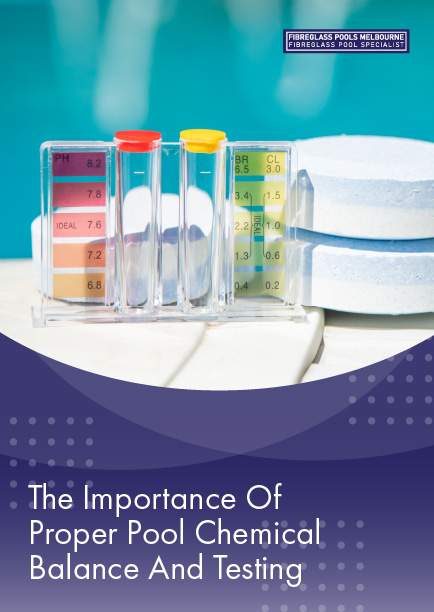
The Role of Essential Pool Chemicals
Chlorine
Chlorine is the superstar of pool chemicals. It’s responsible for killing bacteria, algae, and other harmful microorganisms that can thrive in pool water. Without chlorine, your pool would become a breeding ground for illnesses and infections. Keeping chlorine levels between 1.0 and 3.0 ppm (parts per million) is essential for a healthy swimming environment.
pH
The pH level measures how acidic or alkaline the pool water is. A pH level between 7.2 and 7.8 is ideal. If the pH is too low (acidic), it can cause skin and eye irritation and corrode pool equipment. Conversely, if the pH is too high (alkaline), it can lead to scaling on the pool surface and reduce the effectiveness of chlorine.
Alkalinity
Total alkalinity helps stabilise the pH levels in your pool. It acts as a buffer, preventing sudden changes in pH. Maintaining alkalinity levels between 80 and 120 ppm ensures that your pH levels remain steady. This balance protects the pool’s surface and equipment and makes the water more comfortable for swimmers.
Stabiliser
A pool stabiliser, often cyanuric acid, protects chlorine from being rapidly degraded by the sun’s UV rays. Stabiliser levels should be maintained between 30 and 50 ppm. Without a stabilizer, chlorine would dissipate quickly, leaving your pool vulnerable to contamination.
The Consequences of Imbalanced Pool Chemicals
Health Risks
Imbalanced pool chemicals pose significant health risks. For instance, low chlorine levels can lead to bacterial infections, while high chlorine levels can cause skin and eye irritation. Similarly, improper pH levels can result in discomfort and potential long-term health issues for swimmers.
Equipment Damage
Your pool equipment is also at risk when chemicals are not balanced. Acidic water can corrode metal components, such as ladders and pool pumps, leading to costly repairs. Alkaline water, on the other hand, can cause scaling, which reduces the efficiency of pool heaters and filters.
Aesthetic Issues
Visually, an imbalanced pool is unappealing. Algae growth, cloudy water, and scaling on pool surfaces are common issues that arise from improper chemical balance. These problems can turn your backyard oasis into an eyesore, detracting from the overall enjoyment of your pool.
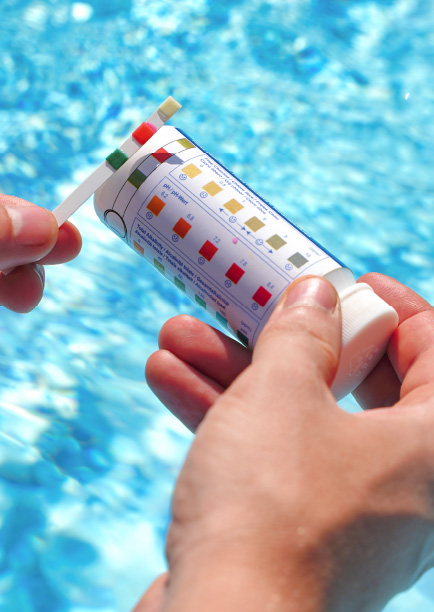
How to Test and Maintain Proper Pool Chemical Balance
Testing Kits
Regular testing is the foundation of maintaining proper pool chemical balance. Use testing kits or test strips to measure chlorine levels, pH, alkalinity, and stabiliser. These kits are user-friendly and provide quick results, allowing you to make necessary adjustments promptly.
Adding Chemicals
Based on your test results, you’ll need to add specific chemicals to balance your pool water. For example, if your chlorine levels are low, add chlorine tablets or granules. To adjust pH levels, use pH increasers or decreasers. Always follow the manufacturer’s instructions and wear protective gear when handling pool chemicals.
Routine Maintenance
Establish a routine maintenance schedule to ensure your pool stays balanced. Check your chemical levels at least twice a week during the swimming season and once a week during the off-season. Regular maintenance helps prevent imbalances and keeps your pool in top condition.
The Benefits of Regular Pool Chemical Maintenance
Safety
The primary benefit of regular pool chemical maintenance is safety. Balanced chemicals prevent the growth of harmful bacteria and algae, ensuring a safe swimming environment for you and your family. It also minimises the risk of skin and eye irritation caused by improper pH levels.
Cost Savings
Consistent maintenance can save you money in the long run. By preventing equipment damage and reducing the need for emergency chemical treatments, you avoid costly repairs and replacements. Additionally, balanced chemicals prolong the lifespan of your pool surfaces and equipment.
Enjoyment
A well-maintained pool is more enjoyable to swim in. Crystal-clear water, free of unpleasant odours and visible contaminants, enhances your swimming experience. Plus, regular maintenance means you spend less time troubleshooting issues and more time enjoying your pool.
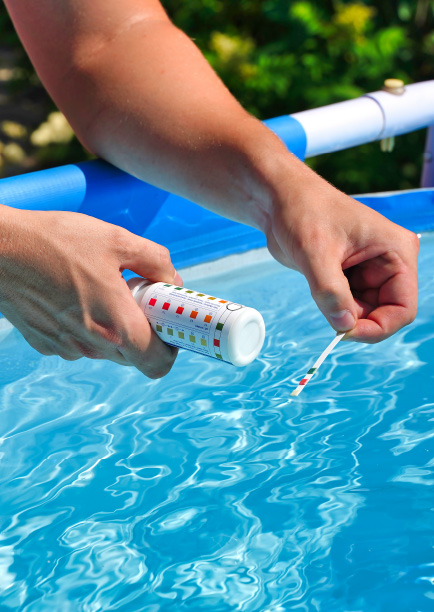
Tips for Troubleshooting Pool Chemical Imbalances
Cloudy Water
Cloudy water is a common issue that indicates improper chemical levels. Test your water and adjust chlorine, pH, and alkalinity levels accordingly. Using a clarifier can also help clear up the water by binding small particles together for easier filtration.
Algae Growth
Algae growth is often a sign of low chlorine levels. Shock your pool with a high dose of chlorine to kill the algae. Brush the pool surfaces and vacuum the debris. Regularly maintain chlorine levels to prevent future algae outbreaks.
Scaling
Scaling occurs when calcium deposits form on pool surfaces and equipment. Test your calcium hardness levels and adjust if necessary. Use a stain and scale remover to treat existing scaling. Maintaining proper pH and alkalinity levels can prevent scaling from recurring.
The Impact of Proper Pool Chemical Balance on Pool Health
Maintaining proper pool chemical balance is essential for the health and enjoyment of your swimming pool. By understanding the role of each chemical, such as chlorine for disinfection, pH balancers for comfort, and algaecides for preventing algae growth, you can keep your pool in optimal condition. Regularly testing and adjusting levels using reliable testing kits ensures that the water remains safe and clean. Additionally, troubleshooting common issues like cloudy water or pH imbalances can prevent larger problems down the line. Remember, a well-balanced pool not only looks great but also saves you time and money in the long run by reducing the need for extensive maintenance and repairs. Investing in proper pool care enhances the overall swimming experience for you and your guests.


